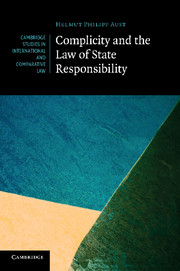Book contents
- Frontmatter
- Contents
- Foreword
- Preface
- Table of cases
- Abbreviations
- 1 Introduction
- 2 Complicity between bilateralism and community interest
- 3 Complicity and the international rule of law
- 4 Complicity in customary international law
- 5 The concept of complicity in Article 16 ASR
- 6 The consequences of complicity
- 7 Complicity and aggravated responsibility
- 8 A network of rules on complicity
- General conclusions
- Bibliography
- Index
1 - Introduction
Published online by Cambridge University Press: 07 September 2011
- Frontmatter
- Contents
- Foreword
- Preface
- Table of cases
- Abbreviations
- 1 Introduction
- 2 Complicity between bilateralism and community interest
- 3 Complicity and the international rule of law
- 4 Complicity in customary international law
- 5 The concept of complicity in Article 16 ASR
- 6 The consequences of complicity
- 7 Complicity and aggravated responsibility
- 8 A network of rules on complicity
- General conclusions
- Bibliography
- Index
Summary
The growing role of complicity in international law
This is a book about State responsibility for complicity. It addresses the question whether States which aid or assist other States in the commission of wrongful acts incur responsibility for their support. For a long time, this issue did not receive much attention. This has changed in recent years. The most prominent example of a situation in which complicity played a role is probably the 2003 US-led war on Iraq. While the US and the UK were the main actors in this conflict, they enjoyed support from a ‘coalition’ of forty-seven States which furnished assistance to varying degrees. In addition, beyond the coalition, there were States such as Germany which officially refused to participate in the attacks, but which nonetheless gave support behind the scenes. How should the contributions of Germany and other European States, which consisted in, for example, the granting of overflight rights or landing and refuelling facilities, be assessed?
Various European States also participated in the programme of so-called ‘extraordinary renditions’. This programme involved the transfer of alleged terrorists to third States where they were then subjected to forceful means of interrogation. If two States cooperate directly in the interrogation of a detained individual and violate human rights in so doing, they carry equal responsibility. But is a State that has allowed the transfer of the detainee through its airspace responsible, and, if so, to what extent? And what can be said of a State which more or less regularly receives information from interrogations in which torture or other degrading treatment have occurred?
- Type
- Chapter
- Information
- Complicity and the Law of State Responsibility , pp. 1 - 10Publisher: Cambridge University PressPrint publication year: 2011

